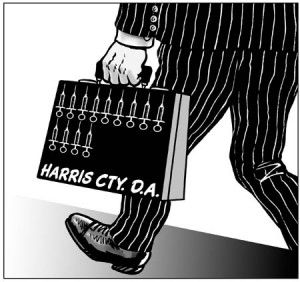Are Prosecutors Getting Away With Too Much?
In a world where prosecutors are supposed to be the champions of justice, often times it is the prosecutors themselves who seem like the bad guy. It’s only a matter of time before we hear yet another story about how some innocent man was exonerated by the courts because it turns out the prosecutor had presented false evidence against him or used overly aggressive techniques in court.
In our legal system today, there are 3 main ways a prosecutor can face disciplinary action. This may seem like there are many avenues for disciplining prosecutors, but as I’ll discuss later, I think these laws are carried out in a way that actually makes it pretty easy for prosecutors to get away with a lot.
1) Being sued in courts by wronged defendants
This is probably the most obvious way to get back at a prosecutor. If you were wrongly convicted because the prosecutor used unscrupulous techniques against you, then you’re going to have your day in court and sue him. The prosecutor can be sued for malpractice in civil court, or in more serious cases, even face criminal charges for his or her actions. The remedy would probably be some amount of monetary compensation.
2) Sanctioned by the court
The court can also bring its own judgment upon a wayward prosecutor for violating court rules. If found guilty, the court can impose a number of sanctions upon the prosecutor. These include disbarment by the court, suspension by the court, monetary fines, and private admonition by the court, among others.
3) Sanctioned by the bar association
The state bar association may also impose sanctions upon prosecutors for professional misconduct. These include any form of temporary or permanent disbarment from the state bar, requirements to take continuing education classes, financial penalties, and other actions as the state bar sees fit.
In reality though, prosecutors are sued far less often than you would think. While it’s true that prosecutors may be sued, the reality is that we have additional laws that prevent prosecutors from being sued in various situations. Under “absolute immunity,” prosecutors cannot be sued for advocative actions that are an essential part of their job (but they may be sued for investigative actions that are more typical of a policeman’s job). Furthermore, under “qualified immunity,” prosecutors cannot be sued unless it was clear that they were violating an established right, and that reasonable people would not have done so in their position.
There are many reasons these immunities exist, but one primary reason is that they actually help prosecutors perform their jobs better. The idea is that prosecutors, and our legal system as a whole, function best when prosecutors use aggressive techniques. Additionally, by the nature of the profession, prosecutors are an easy target for disgruntled defendants to point their fingers at, and therefore be unnecessarily sued. Since we don’t want prosecutors to be timid and afraid of being sued for every choice they make, we give them immunity in court.
But in terms of reducing prosecutorial misconduct, what about the effect of sanctions? Recent news indicates that they don’t do much to curb misconduct either. A recent study shows that in California, courts discipline less than 1% of the cases of prosecutorial misconduct.
Another study shows that since 1997, there have been 201 cases of prosecutorial misconduct in the federal Justice Department. Although the department does not release statistics on how many of these prosecutors it actually disciplines, the study found that according to state bar records, the Justice Department has only temporarily disbarred one prosecutor for misconduct in the last 12 years.
Immunity versus Sanctions
If prosecutorial misconduct is a problem, then what’s the best way to regulate it? Should we take away immunity or be stricter about enforcing sanctions?
I believe there is good reason for giving prosecutors absolute and qualified immunity in court. Because the nature of our legal system is adversarial, prosecutors need to have the leeway to proceed with as much freedom and creativity as possible. If we want that to happen, we must be willing to give them immunity in court.
Therefore, I believe sanctions are both necessary and the best way to keep prosecutorial misconduct at bay. In fact, one of the reasons courts were willing to extend absolute immunity to the degree that they did was because they thought sanctions would be around to counter-balance the effect.
Additionally, as I mentioned earlier, we give prosecutors immunity in court partly because we don’t want to subject them to an endless amount of frivolous lawsuits. But unlike a lawsuit that can be brought against a prosecutor by anyone, sanctions are imposed by courts and bar associations. These are professional legal organizations, and they wouldn’t open up an investigation unless they had good reason to.
Prosecutors in our legal system today function as much more than just advocates. In many cases, they work closely with the police and can even take over the investigation of the case. We give prosecutors an immense amount of power, more so than in any other type of law. For this reason, we should take prosecutorial misconduct seriously and enforce the appropriate punishment against them, just as we would in any other profession.


Comments
I understand about Prosecutors presenting false evidence because the Allegheny County District Attorney’s Office did the same thing to me in Commonwealth of Pennsylvania vs. George D. Walls, PA Super 54, 2010 (2010 WL 1347096)